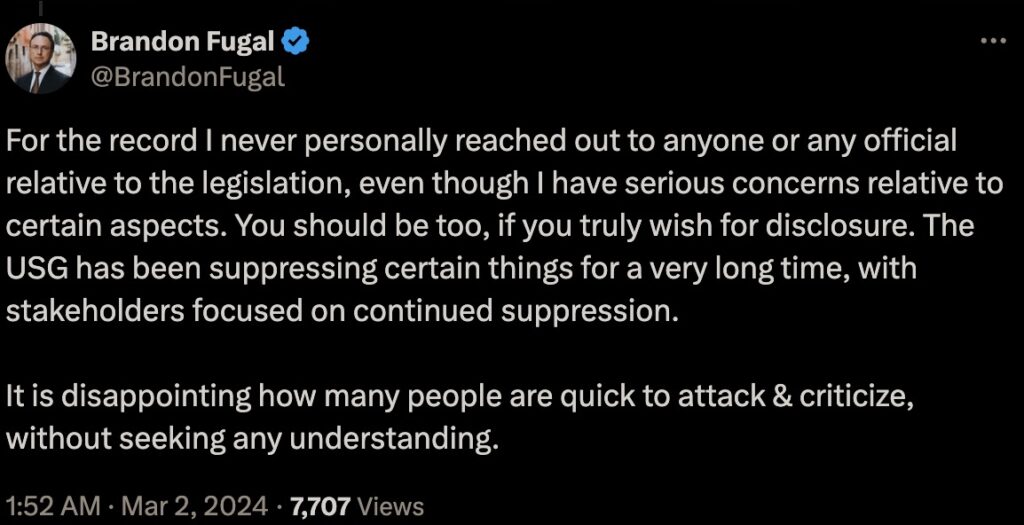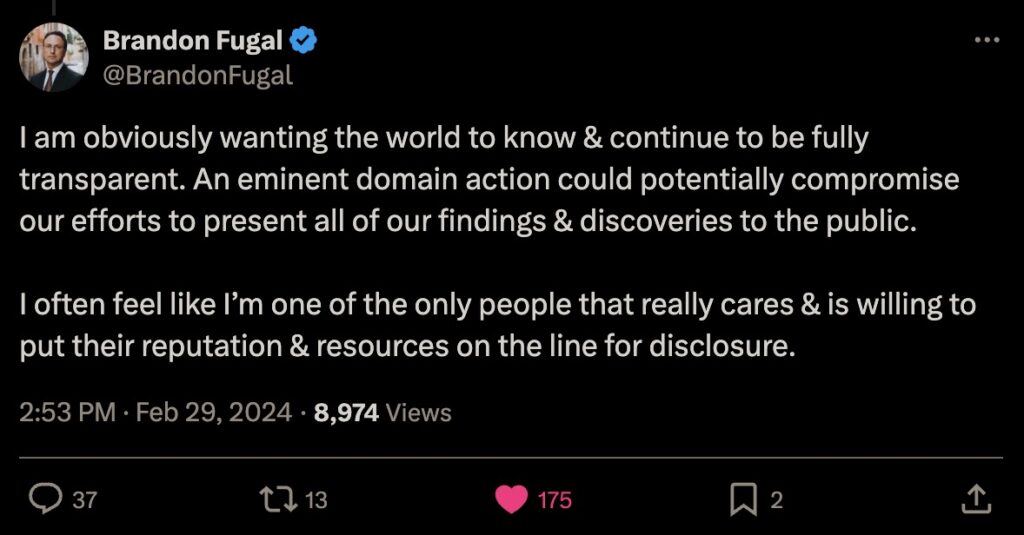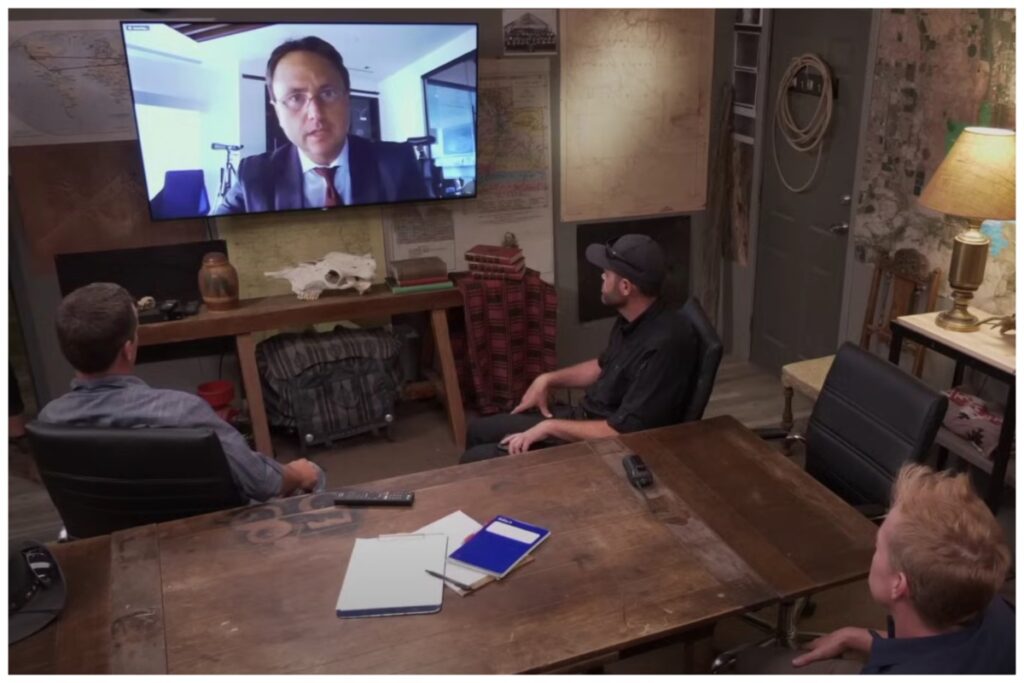Skinwalker Ranch owner Brandon Fugal and scientist Travis Taylor came under scrutiny this week after an email leaked where Taylor allegedly spoke about how he and Fugal had fought against eminent domain provisions in the NDAA’s UAP Disclosure Act. The original version of the act would have given the federal government eminent domain over any UFOs or UFO technology owned by private citizens.
Fugal said that he disagreed with giving the government eminent domain over UFOs because doing so would hurt transparency and disclosure. However, he later added that he did not personally reach out to any officials about the legislation. He also shared that he believes he’s one of the only people willing to put their reputation on the line for full disclosure. Here’s a look at exactly what has been said and why the assertions are going viral on social media.
Here's what Brandon Fugal said about UFO eminent domain & the UAP Disclosure Act. #UAPDA #SkinwalkerRanch Share on XFollow us on TheVerifiedReport.com (coming soon) for more UFO & UAP updates.
A Leaked Email Allegedly Showed Taylor Saying He & Fugal Fought Against Eminent Domain in the Disclosure Act
Christopher Sharp of Liberation Times shared a screenshot of an email allegedly from Travis Taylor of Skinwalker Ranch, written on February 28, where he spoke out about the actions that he and Fugal had taken regarding the UAPDA Schumer-Rounds Act. The original version of the UAP Disclosure Act was changed extensively before it passed in the National Defense Authorization Act. (You can learn more about how the UAPDA was changed in our story here.)
Taylor allegedly wrote: “The opposition to that act was purely Alabama and Utah pushing back on eminent domain. If we did something out of SWR you think the fed should own it! Well, Mr. Fugal didn’t. I didn’t. So we stood up against it.”
In this leaked email, Travis Taylor, former scientist with the UAPTF, indicates that he & Brandon Fugal opposed eminent domain language within the UAPDA.
Multiple sources have confirmed this to me. However, it's essential that both Brandon and Travis retain the right to respond. pic.twitter.com/DqXNjDADaO
— Christopher Sharp (@ChrisUKSharp) February 29, 2024
Sharp said the email originated from Steven Greenstreet, who claimed to have been CC’d on the email.
Greenstreet is a controversial figure in the UFO community who describes himself in his X profile as “Currently debunking UFOs from a basement office.” He has written articles that included quotes about David Grusch being part of a “UFO religion” that “infiltrated the US government and influenced Congress to hunt aliens that aren’t there…”
Greenstreet later tweeted that Taylor had confirmed what he wrote, with a screenshot from Taylor allegedly writing: “I never assumed anything said here was safe! LOL. I’ve said in many public places I oppose Eminent Domain as it violates my 4th amendment rights. So, whatever. If a Green Lantern ring finds me, the government ain’t gonna take it.” ]
Fugal Said He Did Not Reach Out to Anyone Personally About the Legislation & Did Not Lobby Anyone

Fugal addressed the speculation on Twitter and cleared the record about his actions.
He wrote on March 2: “For the record I never personally reached out to anyone or any official relative to the legislation, even though I have serious concerns relative to certain aspects.”
In another tweet, he wrote: “Wrong. I lobbied nobody. Get your facts straight.”
In another message, he wrote: “I am not 100% comfortable with the proposed legislation. I have serious concerns. So should you, if you really cared about disclosure & truth. Did I call anyone, write anyone or actively engage regarding it? NO.”
The Original UAPDA Gave the Government Eminent Domain Over All UFO Tech
As Post Apocalyptic Media previously reported, the original UAPDA gave a wide berth to granting the government eminent domain over UFOs.
A press statement noted about the bill in its original form stated: “the federal government shall have eminent domain over any and all recovered technologies of unknown origin (TUO) and biological evidence of non-human intelligence (NHI) that may be controlled by private persons or entities in the interests of the public good.”
The bill itself read: “The Federal Government shall exercise eminent domain over any and all recovered technologies of unknown origin and biological evidence of non-human intelligence that may be controlled by private persons or entities in the interests of the public good.”
The provision appeared to force private corporations to disclose UAP technology to the government, and not allow them to claim “trade secrets” in order to hide technology from the transparency review board. However, on the flip side, the federal government could have used national security as an excuse to keep that same technology a secret from the public.
All the eminent domain references were taken out of the UAP Disclosure Act when it passed in its final form as part of the NDAA. You can read the full bill here.
Part of both the passed bill and the original bill were modeled after the JFK disclosure act. Unfortunately, this means both versions also included the same loopholes that Presidents have used to continue to keep certain JFK files hidden from the public, even to this day.
Fugal Said Eminent Domain Could Hurt Their UFO Transparency Efforts
Taylor’s statements went viral on X (formerly known as Twitter), and Fugal addressed the concerns publicly.
One person wrote: “While Brandon worries of suppression of information through media, he and Travis Taylor secretly tried to undermine the Schumer-Rounds amendment because they’d want to retain ownership of anything dug up at SWR. Private property is more important than disclosure at SWR apparently.”
Fugal replied that his concern is about transparency, not keeping technology to himself.

He wrote: “I am obviously wanting the world to know & continue to be fully transparent. An eminent domain action could potentially compromise our efforts to present all of our findings & discoveries to the public.”
Then he continued, asserting that his top priority is transparency.
“I often feel like I’m one of the only people that really cares & is willing to put their reputation & resources on the line for disclosure,” he wrote.
In another tweet, he added, “This has nothing to do with ‘lining pockets’. Good grief.”
He later expanded, explaining that he did not reach out to anyone, but has grave concerns about the government suppressing information.
“For the record I never personally reached out to anyone or any official relative to the legislation, even though I have serious concerns relative to certain aspects,” he said. “You should be too, if you truly wish for disclosure. The USG has been suppressing certain things for a very long time, with stakeholders focused on continued suppression. It is disappointing how many people are quick to attack & criticize, without seeking any understanding.”
This work by Stephanie Dwilson is licensed under CC BY-ND 4.0. Please note that this license does not include photos or videos that may be in the story.

